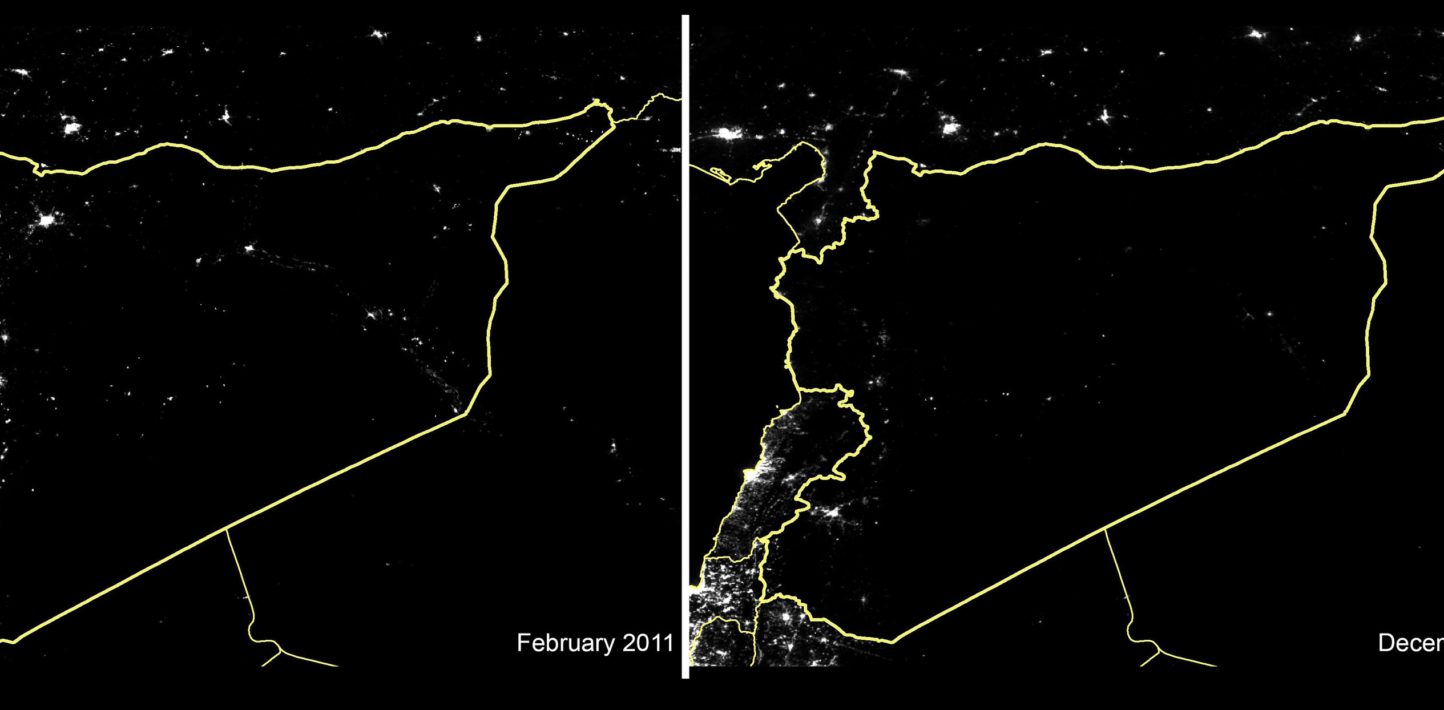Photo: Satellite images showing night time light levels across Syria in February 2011 and December 2014 © #WithSyria and Wuhan University
Sunday 15 March marks four years since the crisis in Syria began. Satellite images released ahead of the anniversary by the #WithSyria global coalition of humanitarian and human rights organizations, including Amnesty International, show that 83% of all the lights in Syria have gone out since the conflict began.
For many Syrian civilians for much of the past four years life has been blighted by darkness and suffering. Yet another year has passed and the situation remains catastrophic.Philip Luther, Director of the Middle East and North Africa Programme at Amnesty International.
“Gross human rights abuses, war crimes and crimes against humanity continue to be committed by government forces and some armed groups, including Islamic State. Scores of peaceful activists and opposition figures remain in detention centres where torture has been committed on an industrial scale, while others have been unlawfully killed,”said Philip Luther.
“The international community’s failure to unite to address one of the defining human rights crises of our times sends the signal that it is wantonly indifferent to the devastating impact of the conflict on civilians in Syria. Such indifference must end.”
The satellite images were analysed by scientists based at Wuhan University in China, in co-operation with the #withSyria coalition of 130 non-governmental organisations.
Satellite imagery is the most objective source of data showing the devastation of Syria on a national scale.
Dr Xi Li, lead researcher, Wuhan University
“Taken from 500 miles above the earth, these images help us understand the suffering and fear experienced by ordinary Syrians every day, as their country is destroyed around them. In the worst-affected areas, like Aleppo, a staggering 97% of the lights have gone out. The exceptions are the provinces of Damascus and Quneitra, near the Israeli border, where the decline in light has been 35% and 47% respectively.”
“Four years since this crisis began, Syria’s people have been plunged into the dark: destitute, fearful, and grieving for the friends they have lost and the country they once knew,” said David Miliband, President and CEO of the International Rescue Committee.
“Over two hundred thousand people have been killed and a staggering eleven million have been forced to flee their homes. Syrians deserve much better from the international community – it is past time to show that we have not given up and will work with them to turn the lights back on.”
The #withSyria coalition also today launched a global petition at withsyria.com that calls on world leaders to ‘turn the lights back on in Syria’ by:
• Prioritising a political solution with human rights at its heart; • Boosting the humanitarian response both for those inside Syria and refugees, including through increased resettlement;
• Insisting that all parties put an end to attacks on civilians and stop blocking aid
Dr Zaher Sahoul, President of the Syrian American Medical Society, said: “The rise of terrorist groups crossing borders has spread fear and focused the world’s attention on Syria – but it has distracted governments from the suffering of ordinary Syrians and the abuses committed by all sides in this conflict. Every day Syrian medics, aid workers and teachers are taking enormous risks to help their neighbours and loved ones, while the international community continuously fails to pursue a political solution and an end to the violence and suffering.”
In 2014, the UN Security Council adopted three resolutions that demanded action to secure protection and assistance for civilians in Syria. Since then, thousands of Syrians have been killed, and more people have been displaced or are in need of help than ever before. A new report Failing Syria released today accuses warring parties and powerful states of failing to achieve what these resolutions set out to do.
Jan Egeland, Secretary General of the Norwegian Refugee Council and former United Nations Undersecretary-General for Humanitarian Affairs, said: “2\014 was the darkest year yet in this horrific war. Civilians are not protected as the Security Council promised they would be, their access to relief has not improved and humanitarian funding is declining compared to the needs. It is an outrage how we are failing Syrians.”


